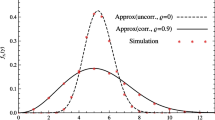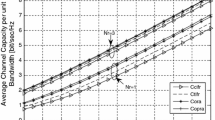Abstract
We consider the maximum-likelihood (ML) decoding performance of concatenated space-time (ST) random coded communication utilizing multiple input and multiple output (MIMO) antennas on quasi-static fading channels. The ensemble-averaged frame error rates of such systems can be upper bounded by the outage probabilities of the corresponding conditional cutoff rates. We refer to these as the information cutoff probabilities and evaluate them numerically for a wide range of ST coding schemes. The slope behaviors of these cutoff probabilities are found to be consistent with the maximum achievable diversity orders given by a new unified bound. With simulations of a class of ST coding schemes based on bit-interleaved coded modulations and iterative spatial/temporal decoders, we further show these cutoff probabilities can provide accurate predictions of total performance gains. We then present numerical results of the p% cutoff capacities, which are defined as the highest supportable rates for target cutoff probabilities at p%. Our discussion show how this new notion can provide a unified view of all the three main theoretic results of MIMO space-time coding: rate enhancements, achievable diversity gains, and performance of specific codes. As a result, this analysis of cutoff capacities reveals the relative strengths and weaknesses of several space-time coding schemes in interesting and surprising ways.
Access this chapter
Tax calculation will be finalised at checkout
Purchases are for personal use only
Preview
Unable to display preview. Download preview PDF.
Similar content being viewed by others
References
S. V. Alamouti, “A Simple Transmit Diversity Technique for Wireless Communications,” IEEE J. Sel. Areas Commun., vol. 16, no. 8, pp. 14511458, Oct. 1998.
L. R. Bahl, J. Cocke, F. Jelinek, and J. Raviv, “Optimal Decoding of Linear Codes for Minimizing Symbol Error Rate,” IEEE Trans. Infor. Theory, Mar. 1974.
J.-F. Cheng, “Performance of MIMO Space-Time Coded Discrete Modulations — Part I: Introduction and Flat Fading Channels,” and “Part II: Extensions and Frequency-Selective Fading Channels,” preprint.
G. J. Foschini, “Layered Space-Time Architecture for Wireless Communication in Fading Environments When Using Multiple Antennas,” Bell Labs. Technical Journal, vol. 2, Autumn 1996.
G. J. Foschini and M. J. Gans, “On Limits of Wireless Communications in a Fading Environment when Using Multiple Antennas,” Wireless Personal Communications, vol. 6, no. 3, pp. 311–335, Mar. 1998.
J.-C. Guey, M. P. Fitz, M. R. Bell, and W.-Y. Kuo, “Signal Design for Transmitter Diversity Wireless Communication Systems over Rayleigh Fading Channels,” IEEE Trans. Commun., vol. 47, no. 4, pp. 527–537, Apr. 1999.
A. R. Hammons, Jr., and H. El Gammal, “On the Theory of Space-Time Codes for PSK Modulation,” IEEE Trans. Infor. Theory, vol. 46, no. 2, pp. 524–542, Mar. 2000.
R. Knopp and P. A. Humblet, “On Coding for Block Fading Channels,” IEEE Trans. Information Theory, vol. 46, no. 1, pp. 189–205, Jan. 2000.
D. J. C. MacKay, R. J. McEliece, and J.-F. Cheng, “Turbo decoding as an instance of Pearl’s `belief propagation’ algorithm,” IEEE J. Sel. Areas Commun., vol. 16, pp. 140–152, Feb. 1998.
E. Malkamäki and H. Leib, “Coded Diversity on Block-Fading Channels,” IEEE Trans. Information Theory, vol. 45, no. 2, pp. 771–781, Mar. 1999.
L. H. Ozarow, S. Shamai, and A. D. Wyner, “Information Theoretic Considerations for Cellular Mobile Radio,” IEEE Trans. on Vehicular Tech., vol. 43, no. 5, pp. 359–378, May 1994.
V. Tarokh, N. Seshadri, and A. R. Calderbank, “Space-Time Codes for High Data Rate Wireless Communication: Performance Criterion and Code Construction,” IEEE Trans. Infor. Theory, vol. 44, no. 2, Mar. 1998.
V. Tarokh, H. Jafarkhani, and A. R. Calderbank, “Space-Time Block Codes from Orthogonal Designs,” IEEE Trans. Infor. Theory, vol. 45, no. 5, July 1999.
E. Teletar, “Capacity of Multi-antenna Gaussian Channels,” European Trans. on Telecom, vol. 10, no. 6, pp. 585–596, Nov.—Dec. 1996.
A. J. Viterbi and J. K. Omura, Principles of Digital Communication and Coding, McGraw-Hill, 1979.
Author information
Authors and Affiliations
Editor information
Editors and Affiliations
Rights and permissions
Copyright information
© 2002 Springer Science+Business Media New York
About this chapter
Cite this chapter
Cheng, JF.(. (2002). Performance of MIMO Space-Time Coding with Discrete Modulations. In: Blaum, M., Farrell, P.G., van Tilborg, H.C.A. (eds) Information, Coding and Mathematics. The Springer International Series in Engineering and Computer Science, vol 687. Springer, Boston, MA. https://doi.org/10.1007/978-1-4757-3585-7_11
Download citation
DOI: https://doi.org/10.1007/978-1-4757-3585-7_11
Publisher Name: Springer, Boston, MA
Print ISBN: 978-1-4419-5289-9
Online ISBN: 978-1-4757-3585-7
eBook Packages: Springer Book Archive




